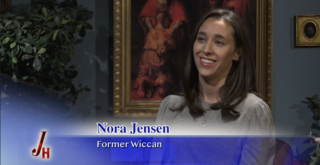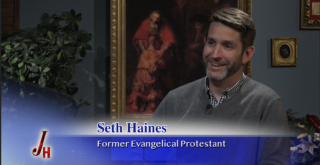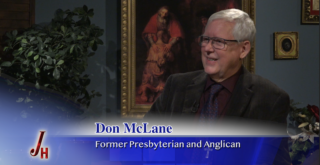
Pontius Pilate asked the basic question for all humanity when he asked Jesus, “What is Truth?” The irony of the scene is powerful and poignant because the incarnate Eternal Truth stood before him. In John 14 Jesus proclaimed, “I am the Way, the Truth and the Life.” Later in the gospel Peter said, “Where else shall we go Lord, but to you? You alone have the words of eternal life.” So the Christian answer to this profound question is that Jesus Himself is the Truth. If you want the truth, come to Him.
This is something all Christians agree on, but this answer does, however, raise more questions: How do we come to know Jesus as truth? How do we get in touch with this Jesus who is truth? We need answers to specific questions, like what should we believe? How shall we behave? How shall we run the church? Jesus may be the truth, but how do we get hold of that truth? How do we know that what we believe is His truth?
In my evangelical days, I was told the truth was to be found in the Bible and in the Bible alone. In my Fundamentalist Bible lessons at Bob Jones University, I memorized a famous and important verse, 2 Timothy 3:16-17: “All Scripture is given by inspiration of God and is useful for doctrine, for instruction, for correction and training in righteousness so the man of God man be fully equipped for every good work.”
In other words, we believed that the Bible was where we were to turn to learn what to believe and how to behave. And we were to believe the Bible because it is inspired — it is God-breathed. But there are some problems with this view. A simple problem is that since 2 Timothy 3:16-17 itself is a part of the New Testament, it could not be referring to the New Testament. Paul — in writing to Timothy — could only have been talking about the Old Testament Scriptures.
But let’s say for the sake of argument that this text also refers to the New Testament. While it certainly says that all Scripture is inspired and can be used to determine doctrine and Christian behavior, it doesn’t say that Scripture is the ONLY authority for God’s truth. In fact, nowhere in the Bible do you find such a thing stated. In addition, if this is the only evidence for biblical inspiration, another problem arises as soon as you start to push things a little.
The problem is this: 2 Timothy 3:16 states: “All Scripture is given by inspiration of God…” This is then used by many to prove that Scripture is inspired. But how do we know that 2 Timothy 3:16 itself is inspired? This reasoning is circular. It goes like this:
“We believe the Bible. OK, why is that? Because it is inspired. Why do we believe it is inspired? Because the Bible says it is inspired and we believe the Bible. OK, how do we know the Bible is inspired? Because the Bible says it is inspired and we believe the Bible because it is inspired.” Too much of this type of reasoning makes you dizzy. There has to be a better answer.
I then encountered another difficulty by the time I got to Bible college. I had always been taught that the Bible was simple to understand; that the basic gospel message was simple and straightforward. But if the gospel message was so simple and straightforward, then why were there so many different Christian denominations all in disagreement with one another?
When I asked one of my teachers, I was told that the different denominations agreed on the basics — those things which were plain and simply understood from Scripture — but they disagreed on the extras. However, when I examined for myself what the different denominations taught they not only disagreed on little things — like whether women should wear hats to church, or whether you had to be baptized by immersion or sprinkling — but they also disagreed on important things, like Baptism in general, communion, how one can be saved, who was in charge of the church, who was going to heaven, and many other things. If Scripture was the only legitimate source of authority, shouldn’t the Church — or churches — be united around one simple, clear teaching from Scripture?
Another verse I was required to memorize was 2 Peter 1:20: “No scripture is of any private interpretation, but holy men of God spake as the Holy Spirit instructed them.” Obviously all the different Christian denominations disagree because they all have different interpretations of the Bible — which they each believe is the most accurate. It struck me that if they all have different interpretations of the Bible, then they must be interpreting it on their own. But 2 Peter 1:20 warns that the Bible must not be interpreted privately. Something was definitely wrong here.
So I wound up with two basic problems:
1. If the Bible is the only support for its own inspiration, then it is merely proving itself which is illogical. There has to be some other authority that can validate the inspiration of the Bible.
2. If the Bible is the only source of authority for Christians, then why are the different churches so divided? Again there has to be some other authority which can decide how the Bible is to be understood.
In both cases, therefore, I was driven to search for this authority.
Live With Disagreements?
In the face of these questions, a lot of people nowadays give up believing in the inspiration of the Bible. About the disagreements in the Body of Christ they say, “Well, sometimes, this side of heaven, you just can’t be sure of the right interpretation. You have to live with these disagreements.”
But can that be true? Is it possible that Jesus called Himself the Way, the Truth and the Life, promised His apostles that they would know the truth (Jn 8:32, 16:13, etc.), commanded them to go out into all the world to preach the gospel, if, at the end of the day, they and we can’t really know what is true after all? Is it possible that we have a gospel to proclaim, but God hasn’t provided a certain way for us to know what that gospel consists of and how it is applied? Have we merely ended up like Pontius Pilate, shrugging our shoulders and saying cynically: “Ahh, what is ‘truth’ anyway?”
There are, however, some excellent rock-solid answers for these questions. The Bible IS inspired, but the evidence for its inspiration rests on something more than 2 Timothy 3:16. There is also a sure-fire way to know the right interpretation of the Bible, but the evidence for that sure interpretation is profound and goes to the very roots of Scripture itself.
The Problem Of The Canon
The Bible didn’t just drop down out of heaven. Although we believe it was inspired by God, this inspiration happened through real people in real situations in a real place and time. The Scriptures were written by the people of God, for the people of God. They were read by the people of God, used to teach the people of God, and used for the worship of the people of God. Maybe the best way to describe the Bible is to say that it is the story of the relationship between God and His people — the Church — both the Old Testament Church and the New Testament Church. The Bible was never just a list of things — a theological textbook — about God telling His people what they must believe. Neither was it merely a set of rules to be obeyed. Instead the Bible was first and foremost the story of God’s loving relationship with humanity.
Furthermore, the same people who wrote the Scriptures — used the Scriptures, prayed the Scriptures and learned from the Scriptures — chose which holy writings should be included as Scripture. Before Christ was born the books of what we now call the Old Testament were well established. During the first century of Christianity the Gospels and epistle letters were all written either by the apostles chosen by Christ or one of their disciples. By the mid-second century, the early Christians were unanimous in accepting the four Gospels and the thirteen letters of Paul. However, also during these early centuries of the Church many, other writings appeared vying for equal acceptance as apostolic documents. Different local churches accepted varying and sometimes contradictory lists of books as authority, until finally in 382 a.d., at the Synod of Rome, a final canon of the books of the Old and New Testaments was presented as authoritative. This is identical to the list found in any contemporary Catholic Bible.
This, therefore, draws our attention to another deep problem with sola Scriptura. Not only is the Bible itself impotent to prove its own inspiration or ensure its own interpretation, it could not specify exactly which of the hundreds of books were to be considered inspired Scripture. Another God-given authority needed to do this, and in the very words of the Synod of Rome we see this authority identified: “Now indeed we must treat of the divine Scriptures, what the universal Catholic Church accepts and what she ought to shun.”
The Authority Of The Church
In the inspired Scriptures — the canon of which, therefore, being determined by the Church under the guidance of the Holy Spirit — we discover the very authority we need to determine what is truth. In 1 Timothy 3:15, the Apostle Paul says something very important: “…God’s church is the household of the living God, the pillar and foundation of truth.”
In Ephesians 3:10, he likewise taught that it was God’s “…intent that through the Church the manifold wisdom of God should be made known.”
In other words it is through the Church that we learn the truth about Jesus — not just through the Bible. It is by belonging to the living body of Christ — the Church — that we come to understand and know the mystery of Jesus Christ Himself.
Paul says that the Church is the pillar and foundation of truth. So the Church is the basis and the support for the truth. It is on the Church that the whole edifice rests and is supported. It’s no exaggeration to say then that not only did the Church establish and validate the inspiration of the Bible, and determine which specific books were to be considered inspired Scripture, but that without the Church we wouldn’t have a Bible at all.
Oral Tradition
But the Church did not pass on the teaching of Christ only in written form. From the earliest days the teaching was also passed on in oral form. In his letters to the young bishop Timothy, Paul wrote, “devote yourself to the public reading of Scripture, to preaching and to teaching.” And, “…continue in what you have learned… because you know those from whom you learned it and how from infancy you have known the holy Scriptures.”
Paul here of course could only have been referring to the Old Testament, which he therefore held as authoritative. But he also believed, however, that his own teaching, both written and preached, were to be taken as authoritative for determining doctrine and right Christian behavior. This is stated most clearly in Paul’s Second Letter to the Thessalonians, 2:15: “So then brothers, stand firm and hold to the traditions we passed on to you whether by word of mouth or by letter.” So the teachings which Paul received from Jesus he passed on both in writing and by word of mouth.
There are many who believe that the word of mouth tradition lost its authority as soon as the biblical books were written down, but it is significant to recognize that in the very quote above, Paul acknowledges that both sources of teaching existed side-by-side when he wrote to the Thessalonians. We also see that while Paul was writing what would later be declared inspired Scripture, he was not only receiving oral tradition from others, but continuing to pass it on to his hearers: “By this gospel you are saved if you hold firmly to the word I preached to you…For what I received I passed on to you as of the first importance.” (1 Cor 15:2-3)
Paul promotes the continuing importance of the oral teaching as well as the written when he tells Timothy: “What you heard from me keep as the pattern of sound teaching with faith and love in Jesus Christ: guard the good deposit which is entrusted to you.” (2 Tim 1:13) Elsewhere he praises the Corinthians for “upholding the traditions which I have passed on to you.” (1 Cor 11:2)
Catholics believe that this ancient teaching of the apostles has been handed on from generation to generation and kept alive by the constant and continual life of the Church. Did Paul think this oral teaching was to be passed on? Paul said to Timothy in 2 Timothy 2:2: “And the things you have heard me say in the presence of many witnesses entrust to reliable men who will also be qualified to teach others.” In other words, he commanded Timothy to hand on the oral tradition which he had received from Paul. It’s interesting that in this passage Paul is referring to four generations of succession — his own, Timothy’s, the people Timothy would teach and the ones they would teach in turn — which the Church would later identify as the process of Apostolic Succession.
The Deposit Of Faith
The documents of the early Church in the years just after the death of the apostles show that they believed their Church leaders had inherited a precious deposit of faith — both in the writings of the apostles and in the oral traditions of the apostles. In about 95 a.d. Clement, the Bishop of Rome, wrote to the Church at Corinth: “the faith of the gospels is established and the tradition of the Apostles is revered.”
Writing about the year 189 a.d. Irenaeus, Bishop of Lyons, wrote: “What if the apostles had not left writings to us? Would it not be necessary to follow the order of tradition which was handed down to those to whom they entrusted the churches?” Elsewhere Irenaeus also pointed out how important this apostolic tradition is for people to know the full truth. “It is possible then for everyone in every church who may wish to know the truth to contemplate the Traditions of the Apostles which has been made known throughout the whole world.”
This helps us answer the difficult question — where do we turn for a faithful interpretation of the Bible? Is there a body of teaching which has been faithfully passed down from the apostles that would help us to interpret the Scriptures the right way? If such a body of teaching exists then it provides a rich mine for us to turn to when we try to interpret the Scripture. If an ancient strand of teaching exists which goes back to the apostles themselves, then we have not only the Scripture for a source book, but we have a rich tapestry of teaching which helps us to understand the Scripture.
As Catholics, we believe that we have just such a source for the proper interpretation of the Bible. So when we have a difficult question of biblical interpretation we don’t just read the rest of the Bible to find the answer to the difficult question. We turn to the tradition as preserved and protected by the Church to see what the people of God believed before us. Did they face the same questions? How did they answer them? Did they face similar circumstances? How did they confront them? Did they face the same doubts, problems, heresies and attacks? How did they stand up for the truth in their day? How can it help us determine the truth today?
The Guidance Of The Holy Spirit
The answer to these questions is based on the belief that Jesus always keeps His promises. He promised that He would send the Holy Spirit upon His apostles to guide them into all truth (John 16:13). He also promised that He would be with His followers forever (John 14:16; Matt 28:19). As a result, the Church has always believed that she carries the responsibility of preserving and protecting the Truth as handed down from Jesus through His apostles, in both written and oral form. And this Spirit of Pentecost is still poured out on the Church — guiding and protecting and teaching.
Some, however, may point with confidence to First John when he assured his disciples: “You have been anointed by the Holy One, and you all know. I write to you, not because you do not know the truth, but because you know it, and know that no lie is of the truth…the anointing which you received from him abides in you, and you have no need that any one should teach you…” (1 Jn 2:20-27)
Therefore, they claim that have no need of a Church to teach them; they have the Holy Spirit within them. They claim that they are not making any private interpretation of Scripture, as Peter warned, but are interpreting it through the Holy Spirit. But this in not what either the apostles meant; the apostles are using their apostolic authority to correct their Spirit-filled hearer’s sometimes erroneous interpretations.
In 2 Peter 1:16-18, Peter claimed teaching authority because he was an eyewitness of Jesus’ life and glory, and received the truth directly from Jesus. He then states in 3:2 that the truth of God which was once was delivered by the holy prophets was now given through the apostles.
What is important to see here is that Peter compares the role of the New Testament apostles to the Old Testament prophets. God directly inspired the prophets. Their preaching was considered to be a direct word from God to the people of God. The apostles, chosen and empowered by Christ, are the God-inspired teachers of the New Testament people of God. When Peter says “No prophecy of Scripture is of any private interpretation” he means that only the Prophet of God — that is, the apostle — is entitled and empowered by the Holy Spirit to give the right interpretation.
Paul agrees with him. In Ephesians 3:5 he says that the mystery of God has now been revealed by the Spirit to God’s holy apostles and prophets. And it is this same Spirit-led group of men who are the foundation of the Church. So Paul says in 2:20 that
the Ephesians are members of the Church, the household of God which is built on the foundation of the apostles and prophets with Christ Jesus as the chief corner stone. Jesus is the corner stone of this Church, but it is the apostles and the prophets — inspired by God’s Holy Spirit — who provide the foundation for the Church. (Cf. Rev 21:14)
This verse fits together with Paul’s other teaching that the Church is the “pillar and foundation of truth” (1 Tim 3:15) So the Church — based on the teaching of the apostles — which was inspired to write the Scripture and inspired to choose which books were to be included in the Bible, is also its chosen, Spirit-filled interpreter of Scripture.
Where Does One Find This Apostolic Church Today?
If it’s true that the apostles were the ones to interpret Scripture, and the apostolic Church was therefore the one to interpret Scripture, does that same apostolic authority exist today? If so, where can we find it?
We have seen that Paul explicitly handed on his teaching authority to Timothy and commanded him to hand that authority on to others who would in turn hand it on to their successors. But Timothy wasn’t the only one. Paul also sent Titus to Crete to establish the Church there. Calling Titus his son in the faith, he said, “The reason I left you behind in Crete was for you to get everything organized there and to appoint presbyters in every town the way I told you.” And what kind of a man must this presbyter be? “He must have a firm grasp of the unchanging tradition so that he can be counted on to expound sound doctrine.” So in the New Testament we see Paul clearly setting up the Church with his sons in the faith as his successors in the various locations.
The writings of the early Church testify that the first generation of Christians after the apostles believed their Church leaders had somehow inherited the same teaching authority that the apostles had.
So Clement, the Bishop of Rome, around 95 a.d. writes: “The Apostles received the gospel for us from the Lord Jesus Christ…and they went out full of confidence in the Holy spirit…and appointed their first fruits…to be bishops and deacons. Our apostles knew there would be strife on the question of the bishop’s office, Therefore, they appointed these people already mentioned and later made further provision that if they should fall asleep other tested men should succeed to their ministry.” So Clement of Rome believed that the apostles — one of whom, John, may still have been alive — had wished for their teaching office to be continued in the Church.
Ignatius of Antioch was martyred in the year 115. In writing to the Trallian Church he equates the Church presbyters with apostles: “Therefore it is necessary (as is your practice) that you should do nothing without the bishop, but be also in subjection to the presbytery as to the apostles of Jesus Christ our hope…”
And Irenaeus who wrote around 180 a.d. also believed firmly that the Church had inherited the authority of the apostles to teach the truth faithfully. According to him it is because the Church leaders have inherited the apostolic authority that they can interpret Scripture properly. So he writes, “By knowledge of the truth we mean: the teaching of the Apostles; the order of the Church as established from earliest times throughout the world…preserved through the episcopal succession: for to the bishops the apostles committed the care of the Church in each place which has come down to our own time safeguarded by…the most complete exposition…the reading of the Scriptures without falsification and careful and consistent exposition of them — avoiding both rashness and blasphemy.”
Remembering that Paul handed on his teaching authority to Timothy and Titus, and seeing how through history that authority has been handed down from generation to generation, Catholics believe that the dynamic and living teaching authority continues to live within the Catholic bishops who have received their ministry in direct line from the apostles, passed down over the last 2,000 years.
Because of this direct link, Catholics believe the Church has a living connection with the apostolic authority, and that within the living apostolic tradition of the Catholic Church we can find a rock-solid, sure, historic, and unified body of teaching which illuminates and interprets the Bible without fail.
This is an edited version of Rev. Dwight Longenecker’s apologetics series for London’s Premier Radio. Dwight was brought up in an evangelical home and graduated from Bob Jones University. He went on to study at Oxford and be ordained as an Anglican minister in England. In 1995 he and his family were received into the Catholic Church and he was subsequently ordained a Catholic priest in 2006.










